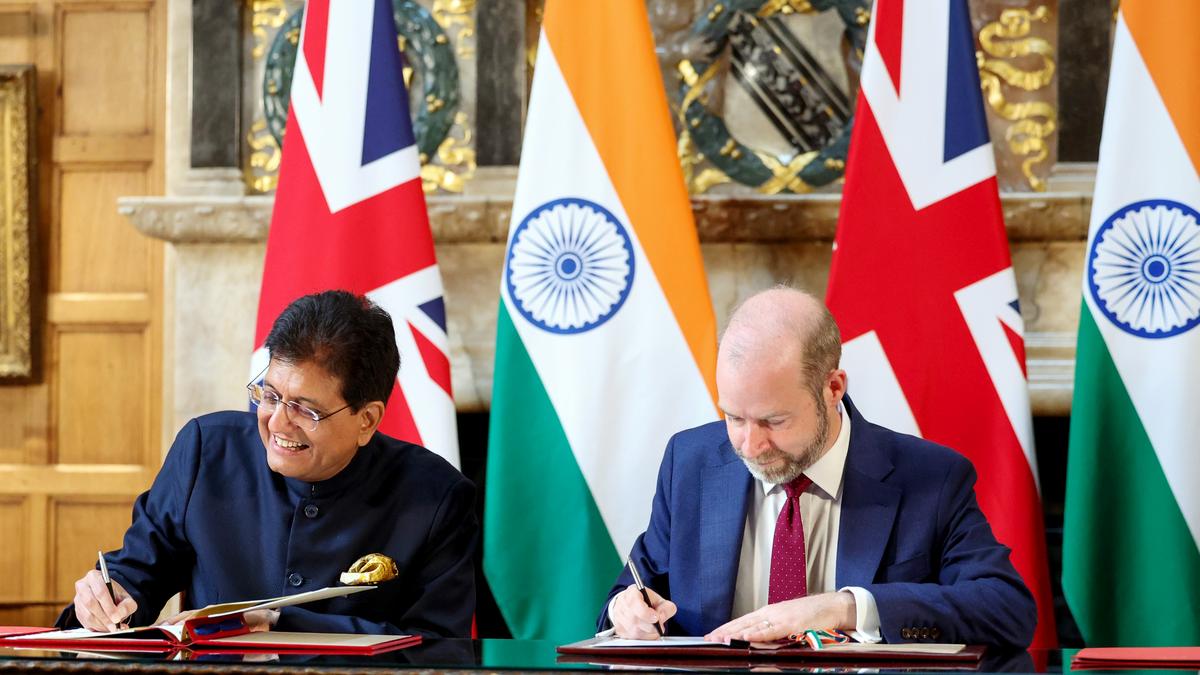The India-UK Comprehensive Economic and Trade Agreement (CETA) has the potential to increase foreign direct investment into India, according to officials, industry participants, and investment analysts. A major driver of this is the local sourcing norm in the agreement that mandates that only goods made in India would be eligible for the tariff reductions.
Also read: India-U.K. trade deal: Agri exports to grow 20% in 3 years, other key sectors to benefit
The CETA, signed by the two countries on Thursday (July 24, 2025), includes a separate chapter on ‘Rules of Origin’, which stipulates what kinds of goods are eligible for the reduced tariffs the deal provides.
“To qualify for reduced tariffs, the rules of origin specify that a product must either be wholly obtained or significantly transformed through processing in either the UK or India,” the documents accompanying the CETA said.
This, it added, was to ensure that only genuinely British or Indian goods could access the preferential tariffs under the agreement.
“This is an important aspect of the deal, since it means that goods imported from abroad, repackaged, and then exported to the U.K. will not be eligible for the zero duties,” a senior government official explained. “This means companies looking to export to the U.K. will have to invest in proper manufacturing here, instead of importing from countries like China.”
He added that, while the U.K. has opened up 99% of its tariff lines, India does not export all of these tariff lines to the U.K..
“However, what the deal does is provide potential,” the official explained. “If a foreign company sees an opportunity to export a particular good to the U.K., it will now view India favourably since they can export from here at zero duty. Importers in the U.K. would prefer imports from India rather than from a country for which they have to pay a duty.
Sarvadnya Kulkarni, CEO of the General Instruments Consortium, an engineering components manufacturer, agreed with this assessment, and said this was especially true for the precision engineering sector.
“The UK-India FTA is expected to significantly enhance foreign direct investment in India’s precision engineering and industrial instrumentation sector,” Mr. Kulkarni told The Hindu. “With reduced tariffs and greater regulatory alignment, UK-based engineering, procurement, and construction (EPC) companies and original equipment manufacturers (OEMs), and process industry investors are likely to find India more attractive for sourcing, joint ventures, and technology transfers.”
He added that the agreement creates a more predictable and transparent trade environment, which is crucial for capital-intensive sectors such as oil & gas instrumentation and process automation.
“This could accelerate investment in manufacturing infrastructure, R&D, and supply chain integration across both countries,” Mr. Kulakarni said.
Krishan Arora, Partner, Leader of the India Investment Roadmap at Grant Thornton Bharat too feels that the CETA marks a new chapter by opening both markets for greater investment and collaboration.
“By liberalising key sectors and lowering entry barriers, the agreement is set to drive high-impact FDI and foster seamless value chain integration,” he said. “Enhanced access to skilled talent across both nations will empower industries from IT to manufacturing, encouraging joint ventures and innovation.”
He added that this trade deal will offer greater predictability for investors, and position both countries as reciprocal hubs of opportunity in the global economy.
Tufan Erginbilgiç, CEO of Rolls-Royce, too, is optimistic about the company’s operations in India.
“The Free Trade Agreement is a landmark in bilateral cooperation,” he said, following the signing of the deal. “Rolls-Royce is growing its aerospace capabilities in India, and we look forward to working with Indian partners to co-develop power and propulsion technologies for India and the world, building on 60 years of successful technology transfer. This will unlock benefits of job creation, technology development and manufacturing growth.”
Published – July 25, 2025 05:53 pm IST
